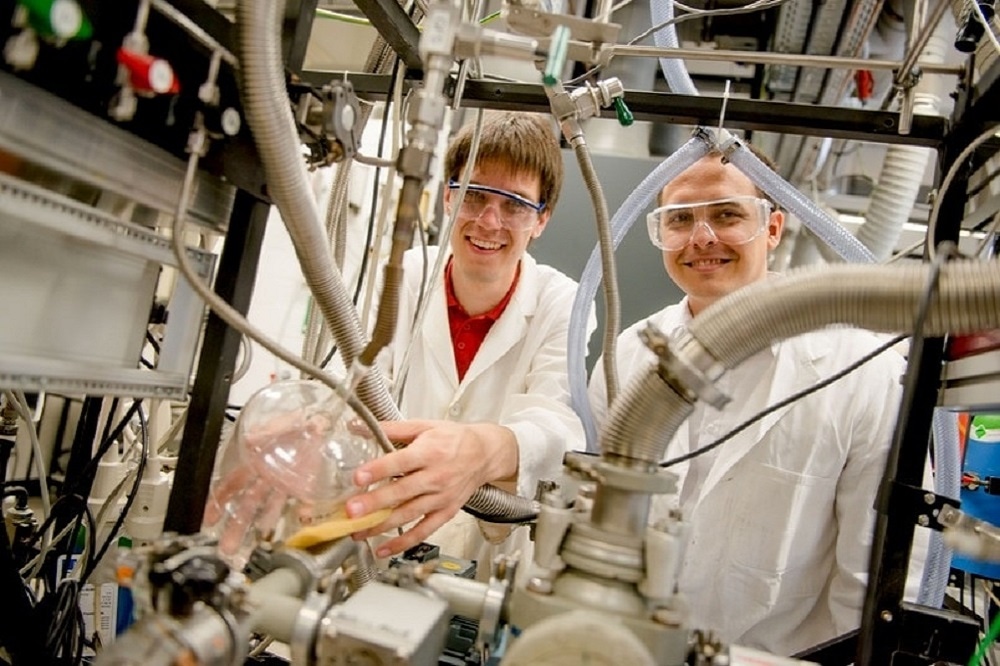Jul 13 2017
Ruhr-Universität Bochum Chemists have discovered evidence proving that carbon atoms are capable of behaving like particles and also like waves. This quantum-mechanical property is common among light particles such as hydrogen atoms or electrons.
 They played a key role in demonstrating the unusual behavior of carbon: Tim Schleif (left) and Joel Mieres Perez (right) © RUB, Marquard
They played a key role in demonstrating the unusual behavior of carbon: Tim Schleif (left) and Joel Mieres Perez (right) © RUB, Marquard
However, only rarely have Researchers observed the wave-particle duality for heavy atoms, such as carbon. The team headed by Prof Dr Wolfram Sander and Tim Schleif from the Chair for Organic Chemistry II in collaboration with Prof Dr Weston Thatcher Borden, University of North Texas, reports in the journal, “Angewandte Chemie”.
Our result is one of few examples showing that carbon atoms can display quantum effects.
Prof Dr Wolfram Sander, Head of the Research Team
The team particularly observed that carbon atoms can tunnel. Thus, they overcame an energetic barrier, even though they do not in fact possess sufficient energy to do that.
Rarely observed for heavy particles
It’s as though a tiger has left his cage without jumping over the fence, which is much too high for him. But he still gets out.
Prof Dr Wolfram Sander, Head of the Research Team
This will only be possible of he acts like a wave, and not like a particle. An object will be able to tunnel based on its mass. For instance, it is possible to observe the phenomenon a lot more easily for light electrons than for comparatively heavy carbon atoms.
The tunnel reaction was explored by the Researchers by using the Cope re-arrangement, referring to a chemical reaction that has been in existence for more than 80 years. A hydrocarbon compound, the starting material for the reaction, is similar to the product molecule. Thus, the same chemical compound is present before and after the reaction. However, a change takes place between the bonds of the carbon atoms during the process.
One of the carbon atoms in the molecule was marked by the Bochum-based Researchers in their experiment. The hydrogen isotope deuterium, a heavier version of hydrogen, was used for replacing the hydrogen atom bonded to the carbon atom. Molecules before and after the Cope re-arrangement changed based on the distribution of the deuterium. Both molecular forms had slightly varied energies because of these different distributions.
Reaction should not actually take place
This difference has little effect at room temperature. Both forms occur equally frequently because of the abundant supply of thermal energy in the adjacent area. However, at extremely low temperatures under ten Kelvin, one molecule form is majorly preferred because of the difference in energy. It is essential for the balance to move from an equal distribution of both forms to an uneven distribution when changing from room temperature to very low temperatures.
However, this transition cannot take place in the standard way, since, it is necessary to overcome an energy barrier when rearranging from one form to the other, even though the molecule itself does not contain the energy for this and the cold environment is also not able to provide it. Despite the fact that the new balance should not occur in the standard way, the team was able to demonstrate it in the experiment. The Researchers concluded that only a tunnel effect will help in explaining the Cope rearrangement at very low temperatures. Experimental evidence was thus provided by the team for a prediction made by Weston Borden more than five years ago based on theoretical studies.
Solvents influence ability to tunnel
At Ruhr-Universität, Wolfram Sander carries out research in the cluster of excellence Ruhr Explores Solvation, where he is involved with the interactions of solvents and dissolved molecules.
It is known that solvents influence the ability to tunnel. However, so far it has not been understood how they do that.
Prof Dr Wolfram Sander, Head of the Research Team